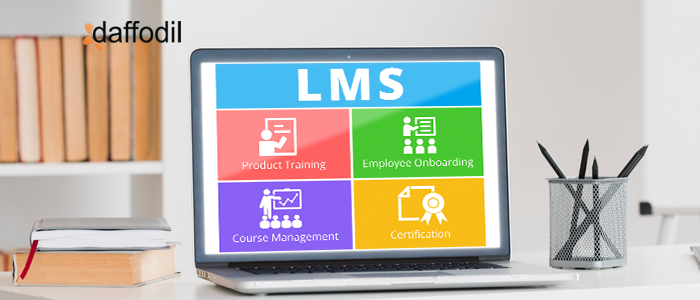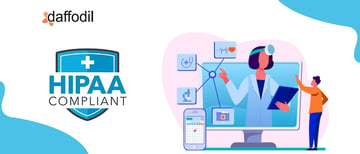
Corporate training is an absolute necessity for businesses today. It is known to significantly improve net income per employee for businesses, along with productivity, morale, and retention of employees. As a result of the benefits that corporate training and development programs offer, Learning Management Systems (LMS) are gaining ground with the global LMS market expected to reach $19 billion by 2022.
A corporate LMS is a software application that helps to automate the process of delivering online courses and other training/learning content to employees. It is a centralized repository of training content that helps in tasks such as employee onboarding and skill development so that the trainees can get into their roles and ultimately, strive in their career with the required pace.
The concept of LMS is widely adopted by large enterprises and mid-scale/small-scale businesses. Large enterprises prefer LMS for training their employees from different affiliates. Here, the LMS can help the resellers, franchises, and other sales channels to stay up to date about new updates on product release, compliance requirements, and more.
On the other hand, small and mid-sized companies can utilize LMS for training their employees and to develop their skill set. By automating some of these tasks, companies save on training costs and empowering their people to grow and adapt according to the constantly changing market. Here are some of the benefits that businesses can avail with LMS software:
- A corporate learning management system is a cost-savior for a business. LMS saves the recurring cost incurred for travel, accommodation of trainers, or the cost of organizing expensive training conferences.
- With training material available on-demand (through e-courses), employees are free to take the training at their own pace and at a time they feel comfortable.
- For the administrators, it is quite easy to keep a track of who completed the course and how well did they perform.
- A learning management system reduces the workload of senior employees for face-to-face mentoring of new employees.
This is an overview of how an LMS can help business. Let’s take a high-end view of the advantages that an LMS can offer.
Corporate LMS: How can it Benefit your Business?
1. Automating New Employee Orientation
A learning management system can help the HR team to automate the employee induction training process. For this, a training program can be created once and can be added to the LMS. The new hires can access this training content, which generally includes the company’s history, their vision, mission, & goals, organization policies and culture, leadership team, key products and services, clients & partners. By creating a self-explanatory content to introduce the company to the new hires. This way, the LMS can work as an employee onboarding software for the HR department.
2. Simplifying Product Training Cycle
Product training is one of the time-consuming jobs in an organization. Not only does it require the trainees to be available at a specific time but also the trainers have to be available to educate the staff. This has two major challenges associated with the process:
a) The valuable time of trainers (senior resources) is invested for recurring training on the same product.
b) The trainees have to wait for the trainer’s availability for coaching on the product and start working on it.
To deal with the problem, organizations can go for online training sessions, which does not time-bound the trainees to onboard with the product/service. Moreover, by integrating online training sessions within a corporate LMS helps to educate employees about new products or services, even before their launch.
Product training sessions enable employees to get trained at their own pace, at a time they feel is the most convenient according to their routine.
Online courses for product training usually give employees a comprehensive idea of its features, benefits, and how to use the product. The training is followed by a quiz/test that helps in assessing employees’ know-how of the product through a training session and understand if they need additional training.
3. Training to Upskill Employees
Along with product training, online training sessions in an LMS can be used to upskill the staff and expand their capabilities. The LMS platform can be utilized in the same way as it is used for product training.
The courses designed for skill training can be designed with gamification which motivates and engages the employees. When employees are trained and upskilled, higher are the chances of their retention, increased productivity, and improved morale to contribute to the company's goals.
4. Sales and Customer Support Training
Every business has different customer policies. For the sales team to understand the customer and sell the products better, it is important to train them. Online training sessions that educate the sales team about customer needs, how to handle objections, close sales, etc. are important for customer acquisition and retention.
By integrating such training courses into the LMS, businesses can ensure that both, the new hires and the existing employees are able to update themselves with company ethics or change in customer management policies or requirements.
Buy or Build an LMS: What’s Better?
Now that we know the numerous benefits of a corporate learning management system, it is the time to understand how to build a reliable LMS for your business. There are two ways to have a corporate LMS for any business:
Buy it: There are several off-the-shelf LMS solutions that can be purchased at a certain cost. There is a recurring cost to it. The benefit is, it’s an instant solution to your requirement. All that you have to do is research for an LMS that has features according to your business requirements and has a great reputation for its capabilities & support.
Build it: Another option to have an LMS is by building customized software. A custom-built solution has benefits such as you can have a simplified LMS with features that your business requires. A custom-built solution is a one-time investment (however, there may be some recurring cost if the product needs an update).
The ball is in your court now. Depending upon business requirements, budget, and timeline, any of the above options to have a learning management system can be chosen.
If you chose to buy an LMS, enlist the requirements and start your research for a well-grounded solution. If its the other way around, i.e. you are planning to build a custom LMS solution, then check out the latter segment that discusses the must-haves of a customized LMS and how to get started with it.
Must-Haves of a Corporate LMS:
Department and User Management: A corporate learning management system can be used for varied purposes, by various departments in an organization. For example, the human resource management can use it for employee onboarding and aligning people for training sessions. On the other hand, the tech team can use it for employee upskill training. It would be convenient for every department and its users to access & manage their training content.
Manage User Roles & Permissions: To define who can do what; user roles and permissions in a software solution are required. In an LMS, create new roles for trainees and facilitators and then map them with departments and courses for ease to access them.
Create Online Training Courses: Training is one of the most important components and use cases of a corporate learning management system. Thus, enabling different departments to create and upload training material is a must-have of the LMS. Depending upon department, location, position, roles, and other criteria, different learning experiences can be created for the LMS users. This defines what, how, and who can access the training courses.
Certification System: Certifications can provide a proof of knowledge acquired by a trainee. At different levels, the trainees can be provided with certifications. To make this possible, the LMS should have the option to add, edit, or delete certificate templates. Along with this, the LMS should enable creating certifications with fields such as total hours trained, details of course/module, faculty name, certificate text, etc.
Employee Scoring System: Employees, especially those who are on skillset training can be assessed for new roles and responsibilities within an organization. This can be done by providing them with a score/rating on the basis of their training, tests, or certifications received.
Webinar Hosting System: Webinars are a great way to connect with people under multiple roofs. Thus, having an option to host webinars is a must-have in a corporate LMS these days.
Apart from these options mentioned above, the LMS can have features such as email templates for mass mailing, support for different languages, chatbot for communication, report generation system, SCORM export, etc. The requirements may vary depending on the business but it would be great to include these must-haves in the learning management system.
Building a Corporate Learning Management System: Getting Started
A corporate LMS is certainly a software solution with a huge scope. Thus, it would be a good idea to work on development in sections. So, that idea is to start with a minimum viable product of the solution first that has all the essential features for corporate LMS. To get started with the MVP of corporate LMS development, connect with our tech-experts to discuss your requirements.



